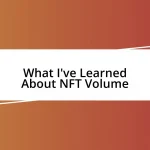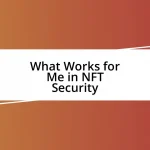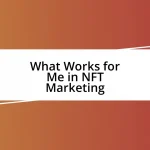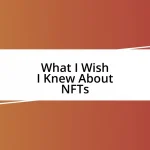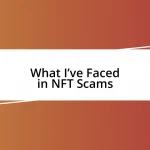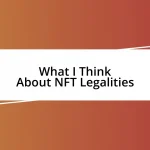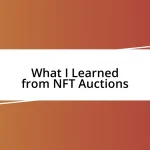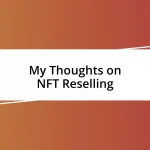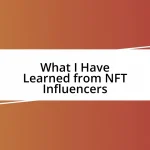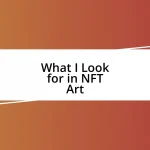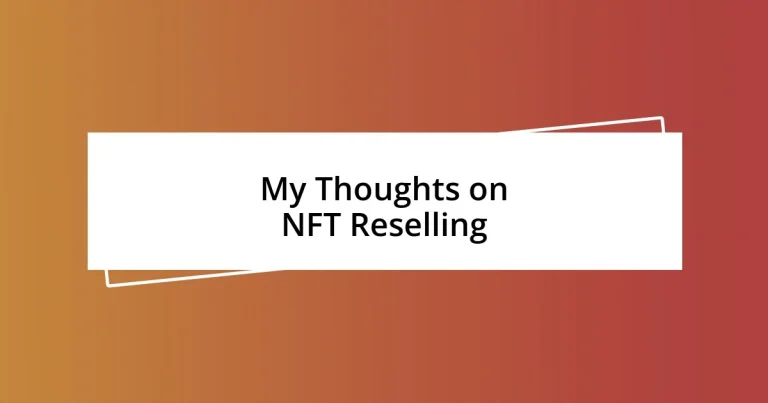Key takeaways:
- NFT reselling values are influenced by factors such as rarity, artist reputation, and market dynamics, with prices capable of rapid fluctuations based on these elements.
- Key platforms like OpenSea, Rarible, and Foundation offer unique features catering to diverse audiences, impacting the selling experience and potential profits.
- Legal considerations, including copyright, local regulations, and tax implications, are crucial for NFT resellers to understand in order to navigate the market successfully.
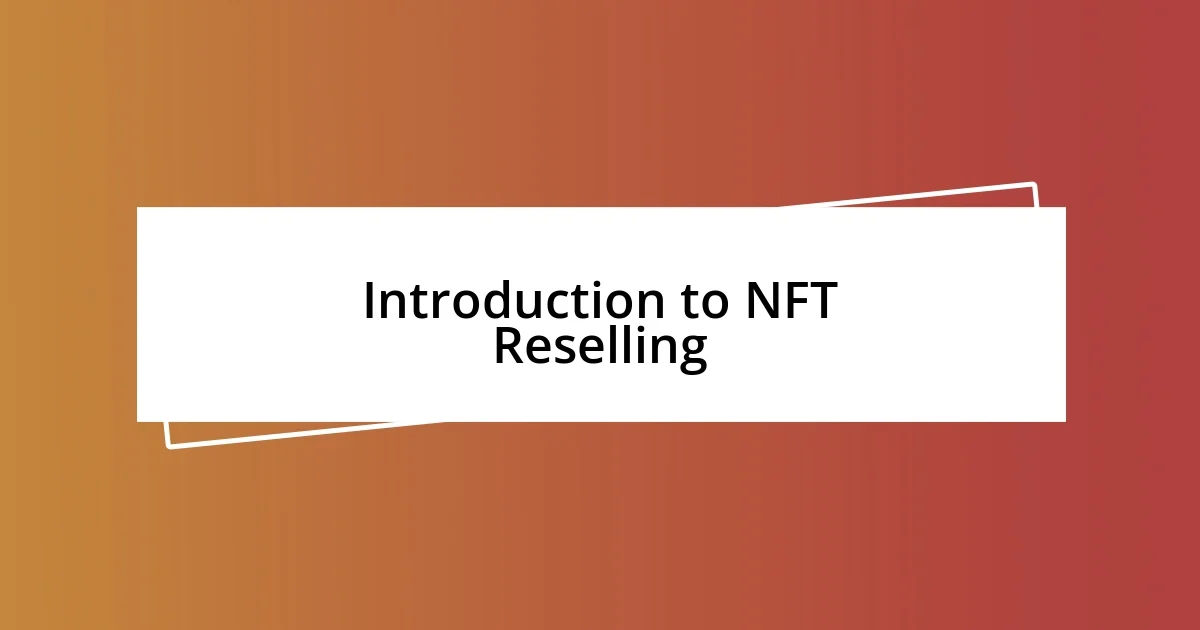
Introduction to NFT Reselling
NFT reselling is intriguing because it sits at the intersection of technology, art, and commerce. I remember my first encounter with NFTs; I was captivated by the idea that a digital image could hold real-world value. It made me question how much worth we place on ownership and authenticity in the digital age.
When diving into the world of NFT reselling, it’s essential to grasp how the rarity and uniqueness of these digital assets play a crucial role in their price. Have you ever wondered why a JPEG can sell for millions? It’s fascinating to see how digital scarcity, combined with social dynamics and trends, can spur bidding wars and drive up the value of a seemingly simple creation.
From my experience, the reselling landscape is fluid, with prices fluctuating based on market demand, artist reputation, and even the time of day you list. I often find myself debating the balance between investing for profit and truly appreciating the art itself. This ongoing internal dialogue is what fuels my interest in the fast-evolving NFT marketplace.
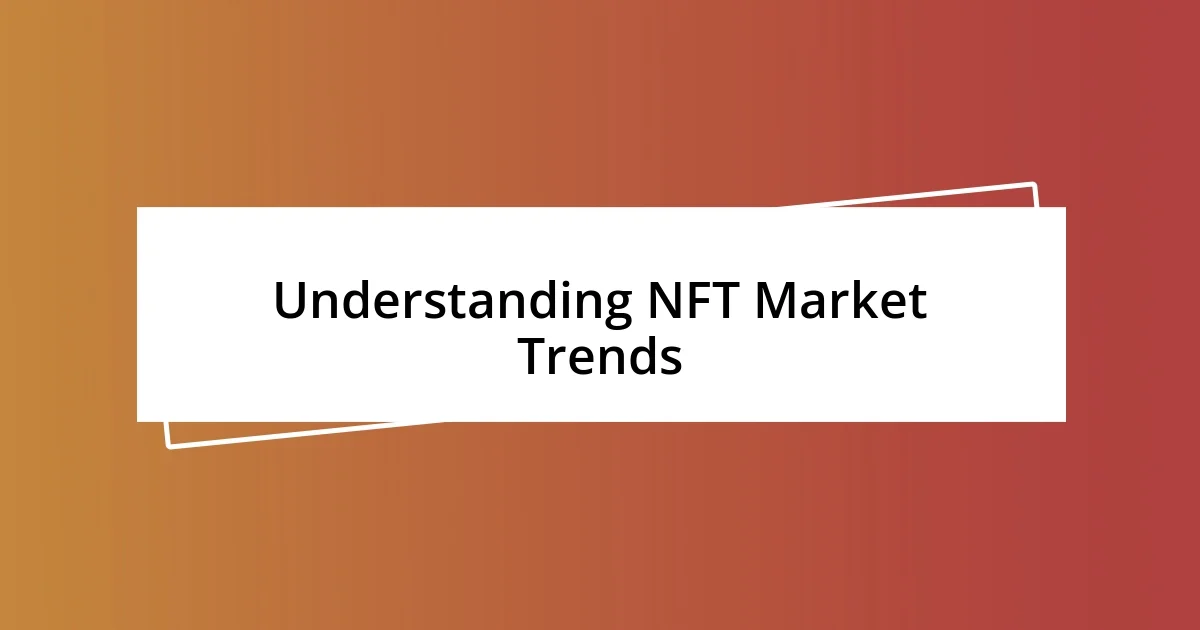
Understanding NFT Market Trends
As I explore the NFT market trends, I can’t help but notice how certain influences drive price fluctuations. For instance, the collaboration of renowned artists with popular platforms can create a buzz that skyrockets demand overnight. I recall a specific drop that I participated in; the energy was electric, and the moment it went live, the pieces sold out within minutes, underscoring the community’s eagerness and the thrill of being in that space.
- Limited editions often create urgency, which can spike interest.
- Social media platforms play a significant role in spreading trends.
- The reputation of the artist can sway buyers’ perceptions drastically.
- Market trends can change swiftly, influenced by global events or media coverage.
- Emotional connections to the art can significantly enhance perceived value.
Understanding these dynamics can provide insight into not just when to buy and sell but also why certain pieces resonate on an emotional level with collectors. It’s a nuanced dance of art and commerce that keeps me engaged.
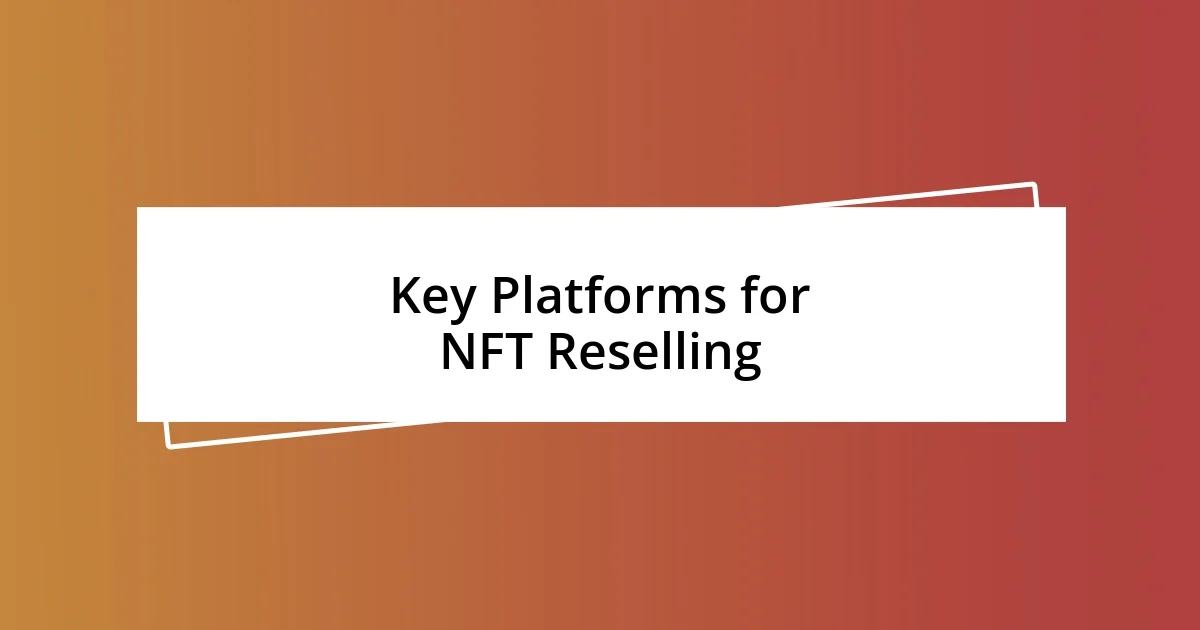
Key Platforms for NFT Reselling
When it comes to NFT reselling, several key platforms stand out for their unique features and user experiences. From my own journey, I’ve found that platforms like OpenSea and Rarible cater to a diverse audience, providing robust marketplaces for various kinds of NFTs. OpenSea, with its extensive collection, feels like standing in the world’s biggest art gallery. I remember scrolling through millions of NFTs, amazed at the sheer variety. In contrast, Rarible’s community-driven approach has always resonated with me because it encourages users to influence the platform directly.
Another platform worth mentioning is Foundation. I had my first experience selling an NFT there, and the sense of exclusivity truly stood out. Foundation enables artists to mint their works only through invites, which creates a more curated experience. It’s intriguing how this exclusivity can drive demand, often resulting in higher price points for sellers. Similarly, SuperRare focuses on high-quality, unique pieces and connects collectors with exceptional artists. My first purchase from SuperRare felt like acquiring a piece of history, and that emotional attachment significantly influences my willingness to resell.
Additionally, there’s the emerging player of Nifty Gateway, which hosts time-limited drops from high-profile artists. I recall participating in a drop that felt like a blockbuster event; the rush of trying to secure a piece was thrilling. This urgency, coupled with strong marketing, often pushes the prices up significantly. Each of these platforms offers distinct experiences and strategies for reselling, so choosing the right one can make all the difference in your NFT journey.
| Platform | Features |
|---|---|
| OpenSea | Large collection, user-friendly interface |
| Rarible | Community-driven, user governance model |
| Foundation | Invite-only minting, curated artworks |
| SuperRare | High-quality pieces, artist-collector connections |
| Nifty Gateway | Time-limited drops, high-profile collaborations |
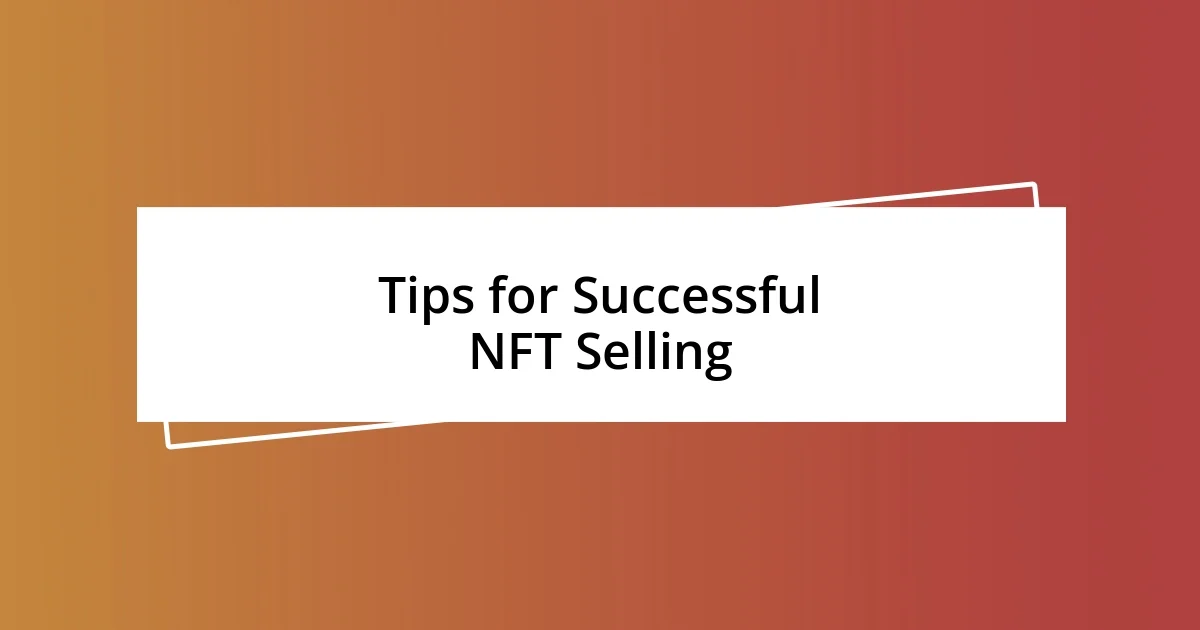
Tips for Successful NFT Selling
One of the best tips for successful NFT selling is to leverage storytelling. I remember selling a piece where I shared the process behind its creation—my inspirations, the challenges I faced, and what it symbolizes. This personal touch not only drew in potential buyers but also made them feel emotionally connected to the artwork. Have you ever considered how a good story can elevate a piece beyond just pixels on a screen?
Pricing your NFTs correctly is another crucial aspect. My experience has taught me that overpricing can deter buyers, while underpricing might compromise the value of your work. It’s a delicate balance. I once underpriced an NFT thinking it would sell quickly, only to realize later that I had undervalued my own effort and creativity. Observing similar pieces in the market helped me recalibrate my pricing strategy.
Lastly, don’t underestimate the power of community engagement. I’ve seen artists thrive by actively participating in forums and social media discussions, building rapport with potential buyers. When I first joined an NFT Discord community, I wasn’t just selling art; I was forming connections. Those genuine interactions often lead to friendships that ultimately result in sales. How can you build your presence in your favorite NFT communities?
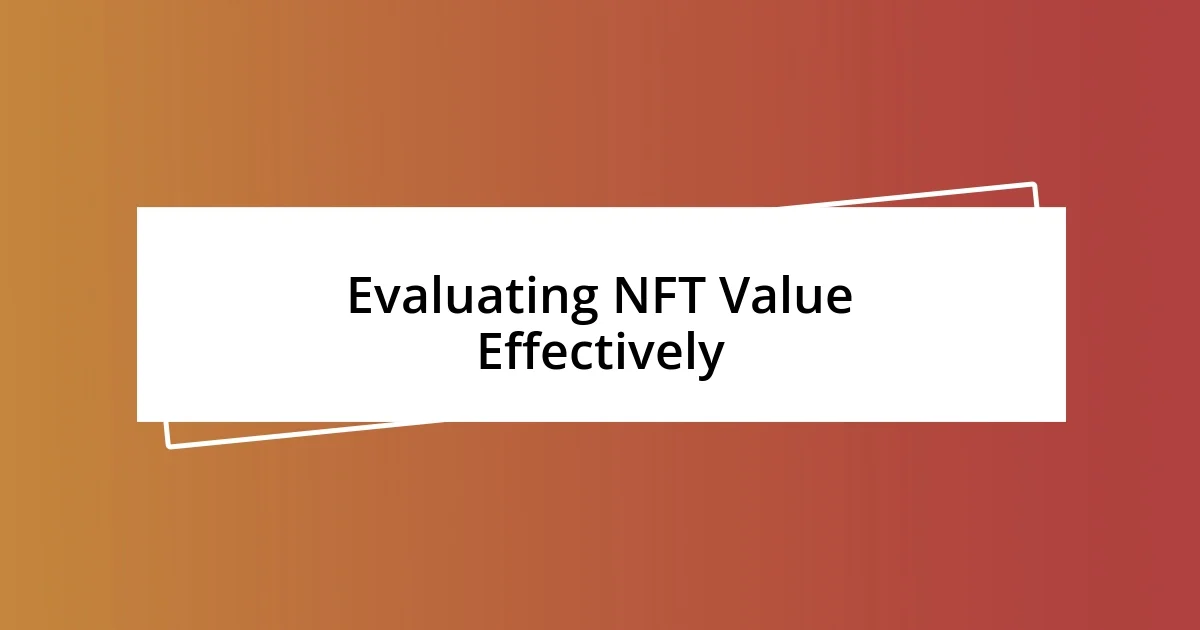
Evaluating NFT Value Effectively
Evaluating the value of NFTs can be quite subjective, but there are significant factors to consider. I often find that rarity plays a huge role; unique or limited-edition pieces tend to carry higher value. For instance, when I was eyeing a rare digital artwork, I could feel my excitement growing just knowing there were only a handful in existence. Have you ever felt that thrill of wanting something because it’s scarce? It’s a powerful motivator in the NFT space.
Then there’s the creator’s reputation, which shouldn’t be overlooked. I remember calculating the potential resale value of an NFT by looking at the artist’s past sales and their overall standing in the community. If an artist has a strong following and consistently sells works at high prices, their pieces might fetch even more in the future. It reminds me of how some emerging musicians see their vinyl records skyrocket in value just because they’ve gained a cult following. Have you thought about how past success might influence future sales?
Lastly, engagement and utility can significantly affect the NFT’s value as well. I once invested in an NFT that provided access to exclusive events, making it more than just a digital asset—it became an experience. I can’t help but wonder how many buyers consider the long-term potential of an NFT’s utility when making purchases. That added layer can uplift a piece’s importance and value, giving it a life far beyond its initial sale.
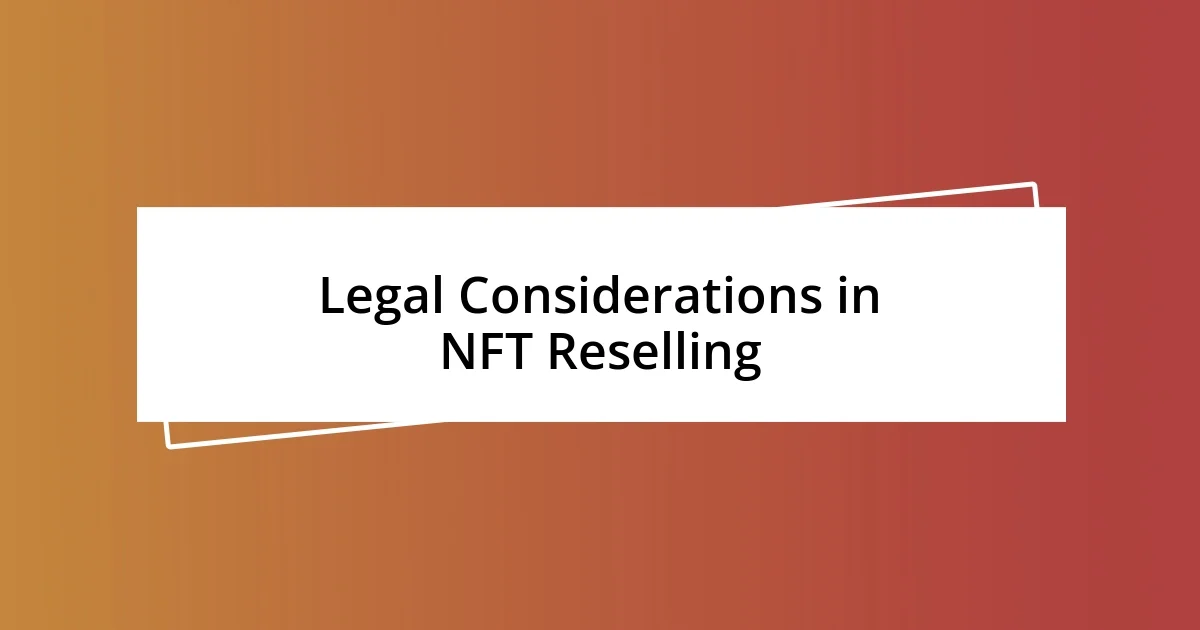
Legal Considerations in NFT Reselling
Navigating the legal landscape in NFT reselling can be quite tricky. I’ve had my share of moments where I felt overwhelmed by copyright complexities. When I resold an NFT, I made sure to double-check the original creator’s rights and any limitations tied to the ownership. It made me realize just how crucial it is to understand not just what you own, but what you can legally do with it. Have you ever been unsure about whether you had the right to resell something? It can be a daunting prospect.
Another important aspect is the impact of local laws on digital transactions. I once encountered a situation where regulations in my country limited the resale of NFTs to specific marketplaces. This taught me that being aware of your jurisdiction’s legal stance on digital assets is essential to avoid potential pitfalls. I’ve often wondered how many resellers overlook these nuances, only to face complications down the line.
Lastly, tax implications are often an afterthought in the excitement of NFT reselling. When I sold my first NFT for a profit, I was both thrilled and blindsided by the fact that I had to report it as income. Understanding how taxes work in this space can genuinely alter the way you approach selling. Have you taken the time to consult a tax professional about how your NFT sales might affect you financially? It’s a conversation that’s well worth having, especially as the market evolves.
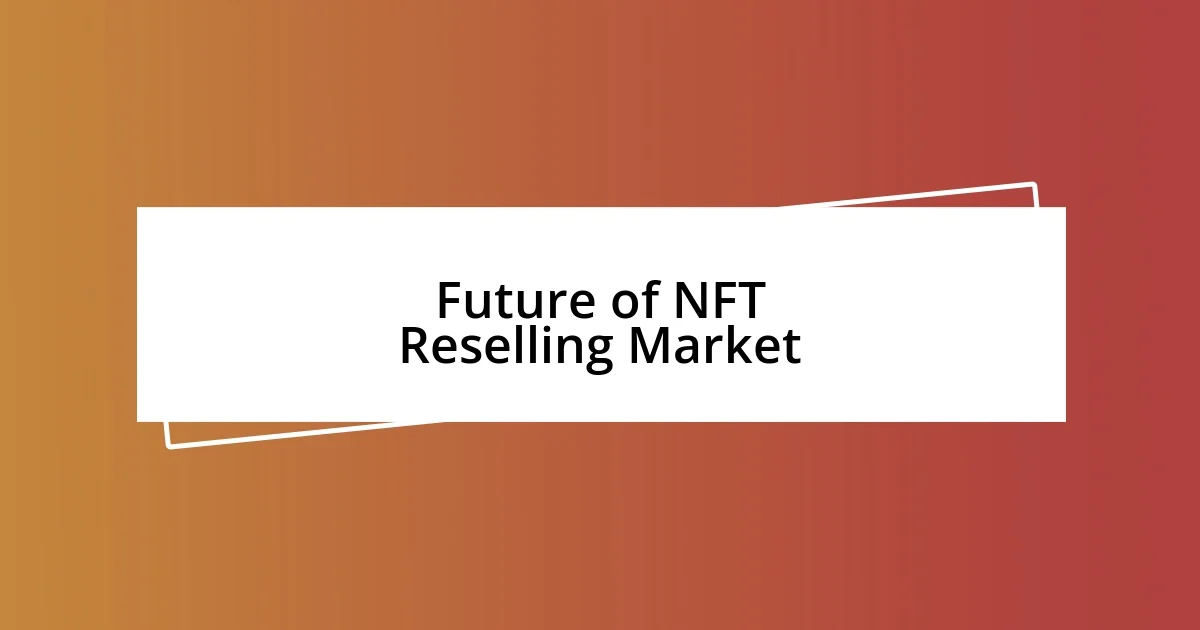
Future of NFT Reselling Market
The future of the NFT reselling market is brimming with potential, but I believe it will heavily depend on how the technology itself evolves. I recently came across a discussion about integrating augmented reality into NFTs, which could revolutionize how we experience and value these digital assets. Can you imagine showcasing an NFT in your living room as a virtual sculpture? That kind of innovation could completely reshape demand.
I also feel compelled to highlight the growing community aspect of NFT platforms. When I first started reselling, I noticed how much the community rallied behind certain projects. This aspect not only drives engagement but also elevates certain NFTs to new heights of value. Have you ever participated in a community event around an NFT drop? That collective excitement can truly enhance perceived value.
Looking ahead, I’m curious about the role of sustainability in the NFT space as well. I recently read articles discussing energy-efficient blockchain solutions that could encourage environmentally conscious purchasing. As awareness of our carbon footprint grows, will buyers become more selective about the platforms they support? That’s a critical question that might influence the future dynamics of NFT reselling.
